Analysis of Criminology Theories on Youth Offending: A Comparison
VerifiedAdded on 2023/01/04
|6
|1602
|37
Essay
AI Summary
This essay delves into various theories explaining youth offending, including differential association theory and strain theory. It begins by introducing the core concepts of these theories and then explores the transatlantic "positive youth justice" and the philosophy of childhood in relation to youth justice. The essay highlights the principles and origins of positive youth justice models in England/Wales and the US, while also considering critiques of these models. The discussion then focuses on Edwin Sutherland's differential association theory, outlining the factors that contribute to criminal behavior through social learning. The essay contrasts this with strain theory, emphasizing the influence of social structures and cultural goals on youth behavior, including Merton's five responses to strain. Ultimately, the essay concludes by comparing the theories and arguing for the relevance of strain theory in understanding the environmental influences on youth choices and behaviors. The paper uses multiple sources to provide a comprehensive analysis.
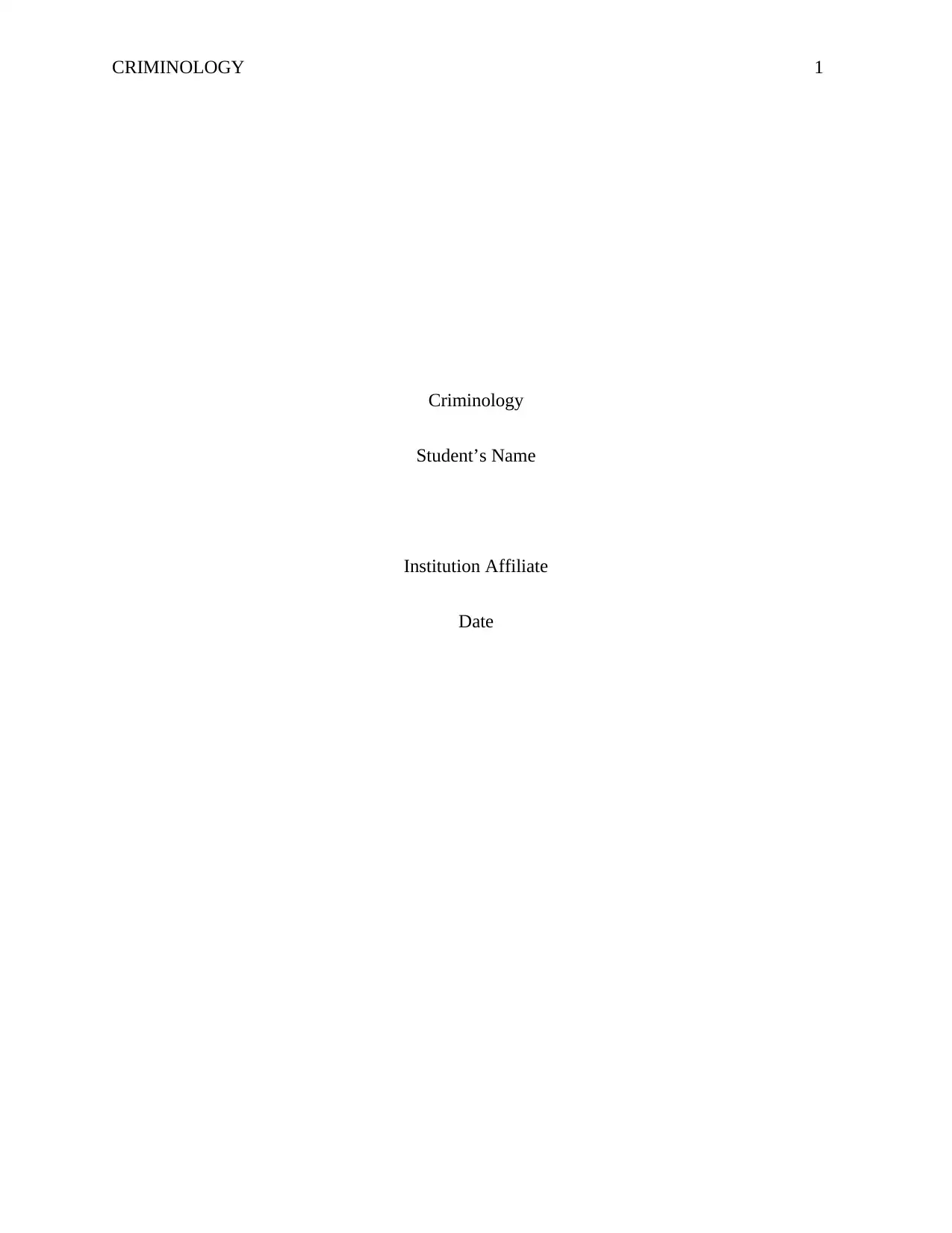
CRIMINOLOGY 1
Criminology
Student’s Name
Institution Affiliate
Date
Criminology
Student’s Name
Institution Affiliate
Date
Paraphrase This Document
Need a fresh take? Get an instant paraphrase of this document with our AI Paraphraser
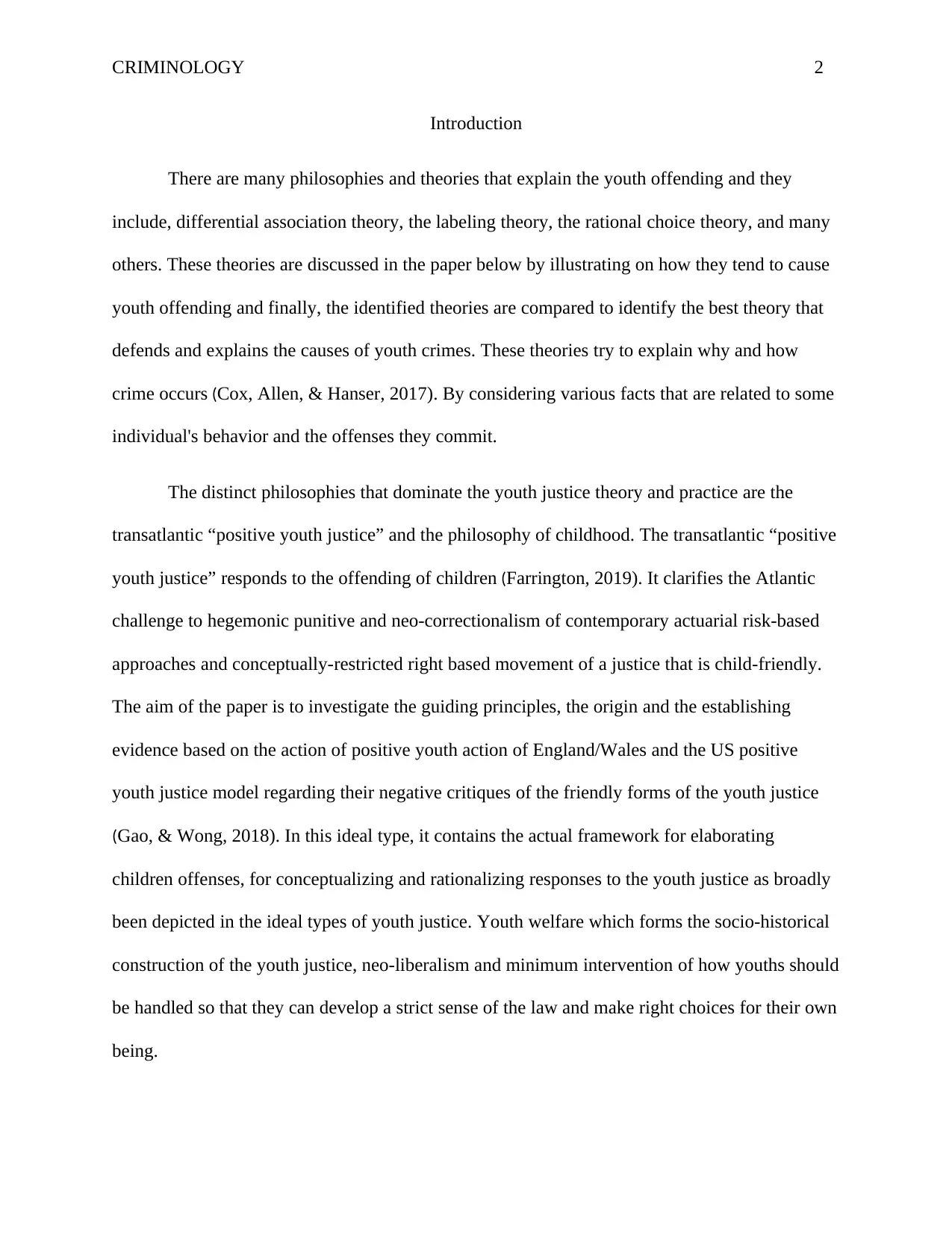
CRIMINOLOGY 2
Introduction
There are many philosophies and theories that explain the youth offending and they
include, differential association theory, the labeling theory, the rational choice theory, and many
others. These theories are discussed in the paper below by illustrating on how they tend to cause
youth offending and finally, the identified theories are compared to identify the best theory that
defends and explains the causes of youth crimes. These theories try to explain why and how
crime occurs (Cox, Allen, & Hanser, 2017). By considering various facts that are related to some
individual's behavior and the offenses they commit.
The distinct philosophies that dominate the youth justice theory and practice are the
transatlantic “positive youth justice” and the philosophy of childhood. The transatlantic “positive
youth justice” responds to the offending of children (Farrington, 2019). It clarifies the Atlantic
challenge to hegemonic punitive and neo-correctionalism of contemporary actuarial risk-based
approaches and conceptually-restricted right based movement of a justice that is child-friendly.
The aim of the paper is to investigate the guiding principles, the origin and the establishing
evidence based on the action of positive youth action of England/Wales and the US positive
youth justice model regarding their negative critiques of the friendly forms of the youth justice
(Gao, & Wong, 2018). In this ideal type, it contains the actual framework for elaborating
children offenses, for conceptualizing and rationalizing responses to the youth justice as broadly
been depicted in the ideal types of youth justice. Youth welfare which forms the socio-historical
construction of the youth justice, neo-liberalism and minimum intervention of how youths should
be handled so that they can develop a strict sense of the law and make right choices for their own
being.
Introduction
There are many philosophies and theories that explain the youth offending and they
include, differential association theory, the labeling theory, the rational choice theory, and many
others. These theories are discussed in the paper below by illustrating on how they tend to cause
youth offending and finally, the identified theories are compared to identify the best theory that
defends and explains the causes of youth crimes. These theories try to explain why and how
crime occurs (Cox, Allen, & Hanser, 2017). By considering various facts that are related to some
individual's behavior and the offenses they commit.
The distinct philosophies that dominate the youth justice theory and practice are the
transatlantic “positive youth justice” and the philosophy of childhood. The transatlantic “positive
youth justice” responds to the offending of children (Farrington, 2019). It clarifies the Atlantic
challenge to hegemonic punitive and neo-correctionalism of contemporary actuarial risk-based
approaches and conceptually-restricted right based movement of a justice that is child-friendly.
The aim of the paper is to investigate the guiding principles, the origin and the establishing
evidence based on the action of positive youth action of England/Wales and the US positive
youth justice model regarding their negative critiques of the friendly forms of the youth justice
(Gao, & Wong, 2018). In this ideal type, it contains the actual framework for elaborating
children offenses, for conceptualizing and rationalizing responses to the youth justice as broadly
been depicted in the ideal types of youth justice. Youth welfare which forms the socio-historical
construction of the youth justice, neo-liberalism and minimum intervention of how youths should
be handled so that they can develop a strict sense of the law and make right choices for their own
being.
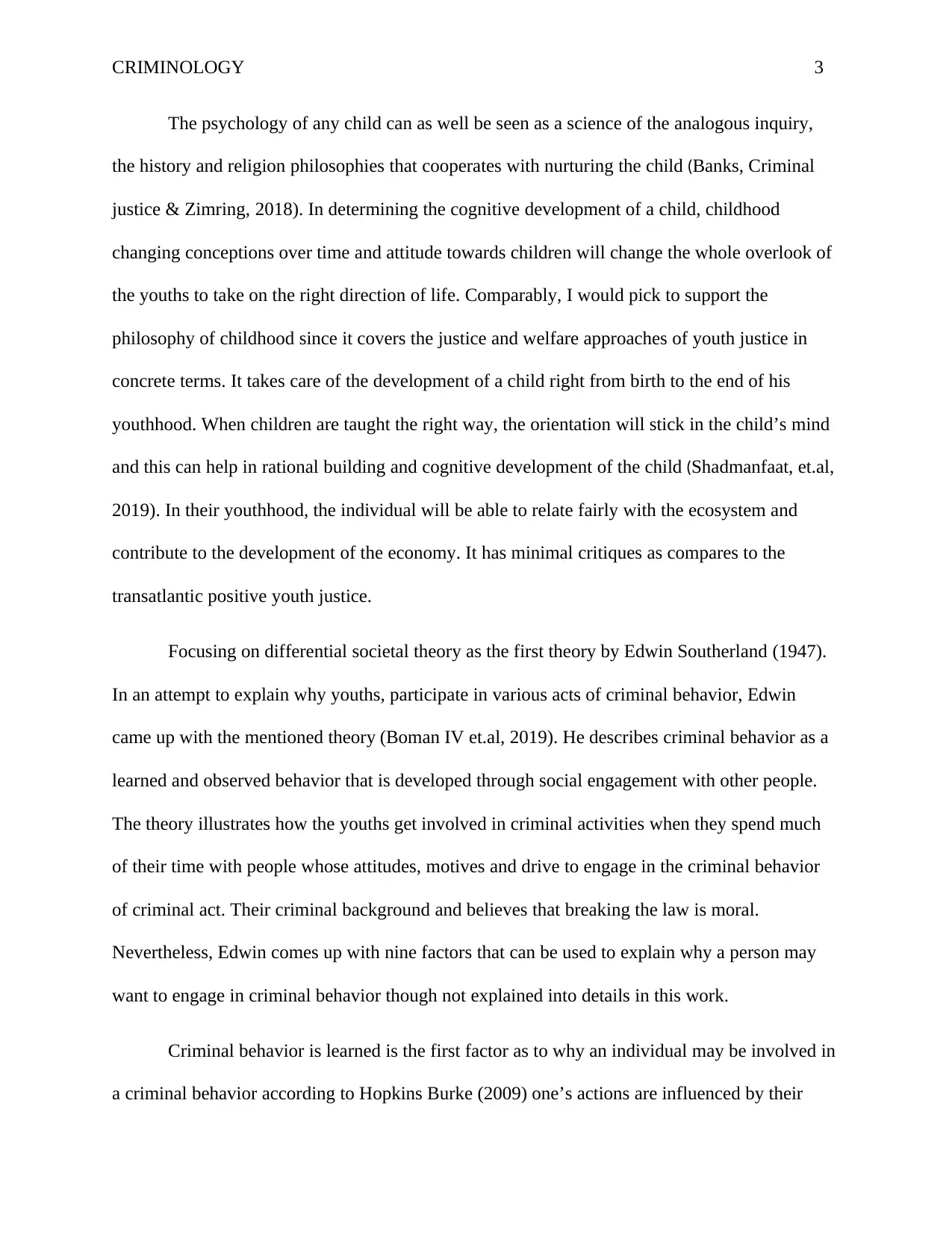
CRIMINOLOGY 3
The psychology of any child can as well be seen as a science of the analogous inquiry,
the history and religion philosophies that cooperates with nurturing the child (Banks, Criminal
justice & Zimring, 2018). In determining the cognitive development of a child, childhood
changing conceptions over time and attitude towards children will change the whole overlook of
the youths to take on the right direction of life. Comparably, I would pick to support the
philosophy of childhood since it covers the justice and welfare approaches of youth justice in
concrete terms. It takes care of the development of a child right from birth to the end of his
youthhood. When children are taught the right way, the orientation will stick in the child’s mind
and this can help in rational building and cognitive development of the child (Shadmanfaat, et.al,
2019). In their youthhood, the individual will be able to relate fairly with the ecosystem and
contribute to the development of the economy. It has minimal critiques as compares to the
transatlantic positive youth justice.
Focusing on differential societal theory as the first theory by Edwin Southerland (1947).
In an attempt to explain why youths, participate in various acts of criminal behavior, Edwin
came up with the mentioned theory (Boman IV et.al, 2019). He describes criminal behavior as a
learned and observed behavior that is developed through social engagement with other people.
The theory illustrates how the youths get involved in criminal activities when they spend much
of their time with people whose attitudes, motives and drive to engage in the criminal behavior
of criminal act. Their criminal background and believes that breaking the law is moral.
Nevertheless, Edwin comes up with nine factors that can be used to explain why a person may
want to engage in criminal behavior though not explained into details in this work.
Criminal behavior is learned is the first factor as to why an individual may be involved in
a criminal behavior according to Hopkins Burke (2009) one’s actions are influenced by their
The psychology of any child can as well be seen as a science of the analogous inquiry,
the history and religion philosophies that cooperates with nurturing the child (Banks, Criminal
justice & Zimring, 2018). In determining the cognitive development of a child, childhood
changing conceptions over time and attitude towards children will change the whole overlook of
the youths to take on the right direction of life. Comparably, I would pick to support the
philosophy of childhood since it covers the justice and welfare approaches of youth justice in
concrete terms. It takes care of the development of a child right from birth to the end of his
youthhood. When children are taught the right way, the orientation will stick in the child’s mind
and this can help in rational building and cognitive development of the child (Shadmanfaat, et.al,
2019). In their youthhood, the individual will be able to relate fairly with the ecosystem and
contribute to the development of the economy. It has minimal critiques as compares to the
transatlantic positive youth justice.
Focusing on differential societal theory as the first theory by Edwin Southerland (1947).
In an attempt to explain why youths, participate in various acts of criminal behavior, Edwin
came up with the mentioned theory (Boman IV et.al, 2019). He describes criminal behavior as a
learned and observed behavior that is developed through social engagement with other people.
The theory illustrates how the youths get involved in criminal activities when they spend much
of their time with people whose attitudes, motives and drive to engage in the criminal behavior
of criminal act. Their criminal background and believes that breaking the law is moral.
Nevertheless, Edwin comes up with nine factors that can be used to explain why a person may
want to engage in criminal behavior though not explained into details in this work.
Criminal behavior is learned is the first factor as to why an individual may be involved in
a criminal behavior according to Hopkins Burke (2009) one’s actions are influenced by their
⊘ This is a preview!⊘
Do you want full access?
Subscribe today to unlock all pages.

Trusted by 1+ million students worldwide
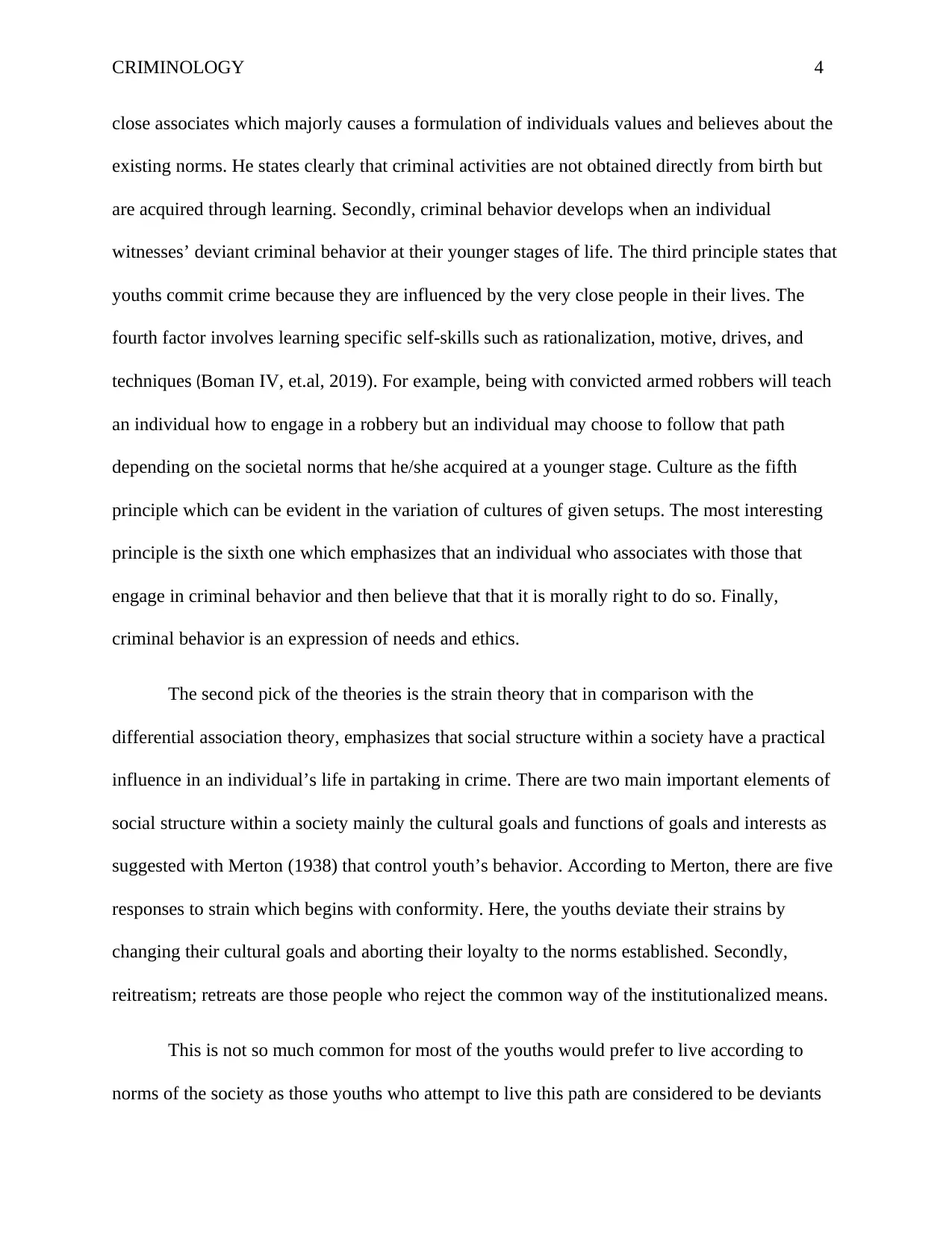
CRIMINOLOGY 4
close associates which majorly causes a formulation of individuals values and believes about the
existing norms. He states clearly that criminal activities are not obtained directly from birth but
are acquired through learning. Secondly, criminal behavior develops when an individual
witnesses’ deviant criminal behavior at their younger stages of life. The third principle states that
youths commit crime because they are influenced by the very close people in their lives. The
fourth factor involves learning specific self-skills such as rationalization, motive, drives, and
techniques (Boman IV, et.al, 2019). For example, being with convicted armed robbers will teach
an individual how to engage in a robbery but an individual may choose to follow that path
depending on the societal norms that he/she acquired at a younger stage. Culture as the fifth
principle which can be evident in the variation of cultures of given setups. The most interesting
principle is the sixth one which emphasizes that an individual who associates with those that
engage in criminal behavior and then believe that that it is morally right to do so. Finally,
criminal behavior is an expression of needs and ethics.
The second pick of the theories is the strain theory that in comparison with the
differential association theory, emphasizes that social structure within a society have a practical
influence in an individual’s life in partaking in crime. There are two main important elements of
social structure within a society mainly the cultural goals and functions of goals and interests as
suggested with Merton (1938) that control youth’s behavior. According to Merton, there are five
responses to strain which begins with conformity. Here, the youths deviate their strains by
changing their cultural goals and aborting their loyalty to the norms established. Secondly,
reitreatism; retreats are those people who reject the common way of the institutionalized means.
This is not so much common for most of the youths would prefer to live according to
norms of the society as those youths who attempt to live this path are considered to be deviants
close associates which majorly causes a formulation of individuals values and believes about the
existing norms. He states clearly that criminal activities are not obtained directly from birth but
are acquired through learning. Secondly, criminal behavior develops when an individual
witnesses’ deviant criminal behavior at their younger stages of life. The third principle states that
youths commit crime because they are influenced by the very close people in their lives. The
fourth factor involves learning specific self-skills such as rationalization, motive, drives, and
techniques (Boman IV, et.al, 2019). For example, being with convicted armed robbers will teach
an individual how to engage in a robbery but an individual may choose to follow that path
depending on the societal norms that he/she acquired at a younger stage. Culture as the fifth
principle which can be evident in the variation of cultures of given setups. The most interesting
principle is the sixth one which emphasizes that an individual who associates with those that
engage in criminal behavior and then believe that that it is morally right to do so. Finally,
criminal behavior is an expression of needs and ethics.
The second pick of the theories is the strain theory that in comparison with the
differential association theory, emphasizes that social structure within a society have a practical
influence in an individual’s life in partaking in crime. There are two main important elements of
social structure within a society mainly the cultural goals and functions of goals and interests as
suggested with Merton (1938) that control youth’s behavior. According to Merton, there are five
responses to strain which begins with conformity. Here, the youths deviate their strains by
changing their cultural goals and aborting their loyalty to the norms established. Secondly,
reitreatism; retreats are those people who reject the common way of the institutionalized means.
This is not so much common for most of the youths would prefer to live according to
norms of the society as those youths who attempt to live this path are considered to be deviants
Paraphrase This Document
Need a fresh take? Get an instant paraphrase of this document with our AI Paraphraser
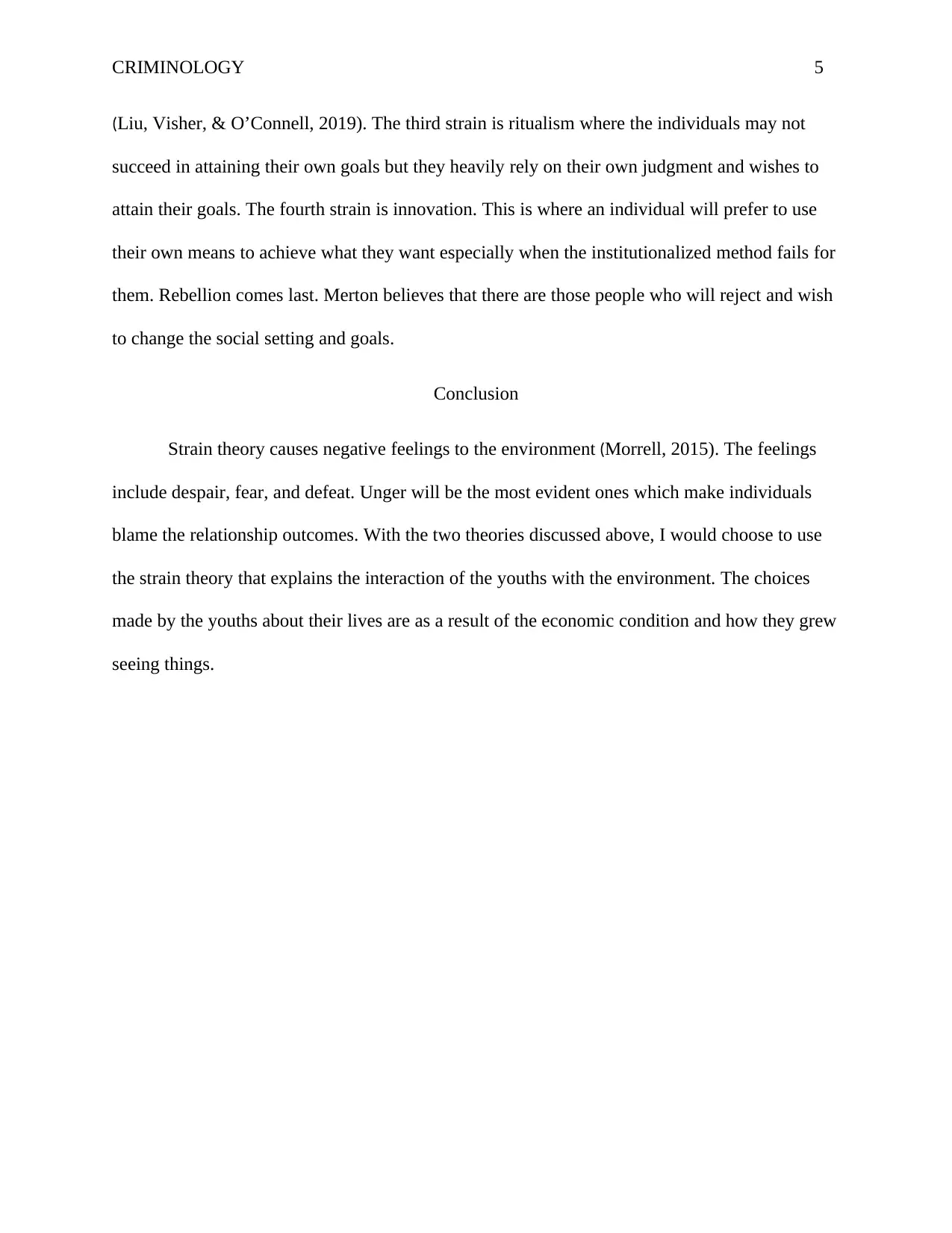
CRIMINOLOGY 5
(Liu, Visher, & O’Connell, 2019). The third strain is ritualism where the individuals may not
succeed in attaining their own goals but they heavily rely on their own judgment and wishes to
attain their goals. The fourth strain is innovation. This is where an individual will prefer to use
their own means to achieve what they want especially when the institutionalized method fails for
them. Rebellion comes last. Merton believes that there are those people who will reject and wish
to change the social setting and goals.
Conclusion
Strain theory causes negative feelings to the environment (Morrell, 2015). The feelings
include despair, fear, and defeat. Unger will be the most evident ones which make individuals
blame the relationship outcomes. With the two theories discussed above, I would choose to use
the strain theory that explains the interaction of the youths with the environment. The choices
made by the youths about their lives are as a result of the economic condition and how they grew
seeing things.
(Liu, Visher, & O’Connell, 2019). The third strain is ritualism where the individuals may not
succeed in attaining their own goals but they heavily rely on their own judgment and wishes to
attain their goals. The fourth strain is innovation. This is where an individual will prefer to use
their own means to achieve what they want especially when the institutionalized method fails for
them. Rebellion comes last. Merton believes that there are those people who will reject and wish
to change the social setting and goals.
Conclusion
Strain theory causes negative feelings to the environment (Morrell, 2015). The feelings
include despair, fear, and defeat. Unger will be the most evident ones which make individuals
blame the relationship outcomes. With the two theories discussed above, I would choose to use
the strain theory that explains the interaction of the youths with the environment. The choices
made by the youths about their lives are as a result of the economic condition and how they grew
seeing things.
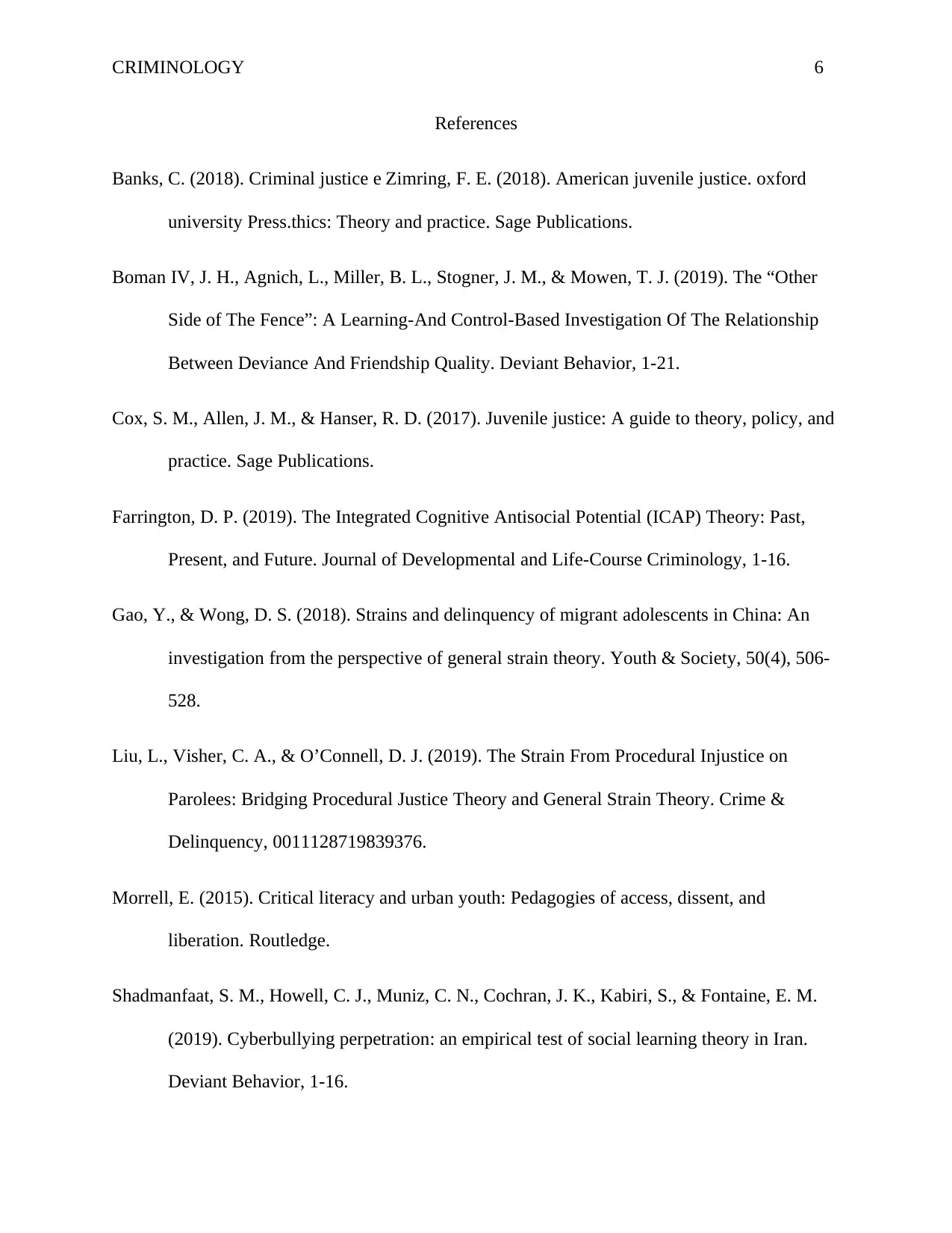
CRIMINOLOGY 6
References
Banks, C. (2018). Criminal justice e Zimring, F. E. (2018). American juvenile justice. oxford
university Press.thics: Theory and practice. Sage Publications.
Boman IV, J. H., Agnich, L., Miller, B. L., Stogner, J. M., & Mowen, T. J. (2019). The “Other
Side of The Fence”: A Learning-And Control-Based Investigation Of The Relationship
Between Deviance And Friendship Quality. Deviant Behavior, 1-21.
Cox, S. M., Allen, J. M., & Hanser, R. D. (2017). Juvenile justice: A guide to theory, policy, and
practice. Sage Publications.
Farrington, D. P. (2019). The Integrated Cognitive Antisocial Potential (ICAP) Theory: Past,
Present, and Future. Journal of Developmental and Life-Course Criminology, 1-16.
Gao, Y., & Wong, D. S. (2018). Strains and delinquency of migrant adolescents in China: An
investigation from the perspective of general strain theory. Youth & Society, 50(4), 506-
528.
Liu, L., Visher, C. A., & O’Connell, D. J. (2019). The Strain From Procedural Injustice on
Parolees: Bridging Procedural Justice Theory and General Strain Theory. Crime &
Delinquency, 0011128719839376.
Morrell, E. (2015). Critical literacy and urban youth: Pedagogies of access, dissent, and
liberation. Routledge.
Shadmanfaat, S. M., Howell, C. J., Muniz, C. N., Cochran, J. K., Kabiri, S., & Fontaine, E. M.
(2019). Cyberbullying perpetration: an empirical test of social learning theory in Iran.
Deviant Behavior, 1-16.
References
Banks, C. (2018). Criminal justice e Zimring, F. E. (2018). American juvenile justice. oxford
university Press.thics: Theory and practice. Sage Publications.
Boman IV, J. H., Agnich, L., Miller, B. L., Stogner, J. M., & Mowen, T. J. (2019). The “Other
Side of The Fence”: A Learning-And Control-Based Investigation Of The Relationship
Between Deviance And Friendship Quality. Deviant Behavior, 1-21.
Cox, S. M., Allen, J. M., & Hanser, R. D. (2017). Juvenile justice: A guide to theory, policy, and
practice. Sage Publications.
Farrington, D. P. (2019). The Integrated Cognitive Antisocial Potential (ICAP) Theory: Past,
Present, and Future. Journal of Developmental and Life-Course Criminology, 1-16.
Gao, Y., & Wong, D. S. (2018). Strains and delinquency of migrant adolescents in China: An
investigation from the perspective of general strain theory. Youth & Society, 50(4), 506-
528.
Liu, L., Visher, C. A., & O’Connell, D. J. (2019). The Strain From Procedural Injustice on
Parolees: Bridging Procedural Justice Theory and General Strain Theory. Crime &
Delinquency, 0011128719839376.
Morrell, E. (2015). Critical literacy and urban youth: Pedagogies of access, dissent, and
liberation. Routledge.
Shadmanfaat, S. M., Howell, C. J., Muniz, C. N., Cochran, J. K., Kabiri, S., & Fontaine, E. M.
(2019). Cyberbullying perpetration: an empirical test of social learning theory in Iran.
Deviant Behavior, 1-16.
⊘ This is a preview!⊘
Do you want full access?
Subscribe today to unlock all pages.

Trusted by 1+ million students worldwide
1 out of 6
Your All-in-One AI-Powered Toolkit for Academic Success.
+13062052269
info@desklib.com
Available 24*7 on WhatsApp / Email
![[object Object]](/_next/static/media/star-bottom.7253800d.svg)
Unlock your academic potential
Copyright © 2020–2026 A2Z Services. All Rights Reserved. Developed and managed by ZUCOL.
